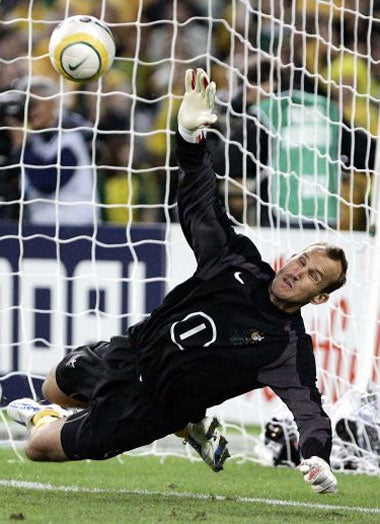Schwarzer ends 32-year wait for Australia

Whenever Mark Schwarzer needs a favour in the Middlesbrough dressing-room clean socks, the loan of a shin pad, some hair gel he knows who to ask. For the rest of his life Mark Viduka will be indebted to his Riverside team-mate and Australian compatriot.
Viduka, the Australian captain who had spoken passionately about leading from the front prior to the match, nearly blew Australia's World Cup ambition when a campaign that stretched across several time zones and took in trips to Tahiti and Montevideo became condensed into a penalty shoot-out.
Trailing 1-0 from Friday's first leg Australia levelled on aggregate through Marco Bresciano's first-half goal. But despite pressing hard they could not score again in regular or extra time. Schwarzer saved Uruguay's first spot-kick, taken by Marcelo Zalayeta of Juventus. Lucas Neill, of Blackburn, Liverpool's Harry Kewell and Cardiff's Tony Vidmar scored for Australia but Viduka looked to have offered Uruguay a route back when he put Australia's fourth kick wide.
Then Schwarzer saved again, this time from Dario Rodriguez. That left John Aloisi, the former Coventry City striker, with the chance to secure qualification. He took it.
The result avenged Australia's bitter defeat four years ago to the same opposition. Relations between the teams were just as bad this time and Schwarzer claimed Jorge Fossati's team had tried to intimidate Australia in the tunnel yesterday. "They have been playing games since day one," he said. "They weren't very sporting so it was great to put one over on them."
The Socceroos went out in the group stages in 1974 but with a squad stocked with players with European experience they are aiming for the knock-out rounds this time. Schwarzer said: "We want to achieve great things we've got the team to do it and the manager to do it."
That manager is Guus Hiddink, one of the game's most respected coaches. He took the Netherlands to the 1998 semi-finals, and South Korea to the last four in 2002. Hiddink will continue to combine the post with coaching PSV Eindhoven.
Australia's success could have damaging ramifications for England's proposed bid to stage the 2018 World Cup finals. Australia are also planning a bid and their first finals appearance since 1974 can only enhance the credibility of such an attempt. After Germany defeated South Africa to win the right to stage next summer's finals Fifa instituted a rotation policy beginning with Africa in 2010(South Africa are staging the finals) and South America in 2014. After that it may go "out of turn" to Europe, which is what the FA is banking on.
In Australia's favour is that their selection would spread the game's global influence. Against them is the time difference European television money sustains Fifa's economy.
Australia: Schwarzer (Middlesbrough), Neill (Blackburn), Chipperfield (FC Basle), Cahill (Everton), Vidmar (Cardiff), Popovic (Crystal Palace), Emerton (Blackburn), Viduka (Middlesbrough), Grella (Parma), Culina (PSV Eindhoven), Bresciano (Parma). Substitutes: Kewell (Liverpool) for Popovic, 32; Aloisi (Alaves) for Bresciano, 96; Skoko (Wigan Athletic) for Emerton, 111.
Step towards dream where Socceroos rule football
It was not just the 83,000-strong crowd at Sydney's Telstra Stadium that went wild last night, writes Kathy Marks in Sydney. The entire nation was in seventh heaven.
It is 31 years since Australia went to a World Cup, and those three decades have been characterised by excruciating defeats at the final hurdle. Four years ago it was Uruguay that shattered the nation's dreams. In 1997 it was Iran, who scored twice in the final minutes of a play-off second leg .
World Cup qualification was the last holy grail for Australia, which excels at so many sports but has been frustrated in its yearning to be taken seriously as a football nation.
Soccer, as they call it here, plays a distant second fiddle to Australian Rules and the two rugby codes in terms of popularity, money and airtime. The national competition was for a long time in disarray, the most talented players heading to Europe.
But World Cup qualification will provide the morale boost soccer has needed,rescuing it from the ocean of footballing minnows in which it has floundered.
The national side have proved their worth. Last night was, perhaps, the start of a new era.
Subscribe to Independent Premium to bookmark this article
Want to bookmark your favourite articles and stories to read or reference later? Start your Independent Premium subscription today.

Join our commenting forum
Join thought-provoking conversations, follow other Independent readers and see their replies